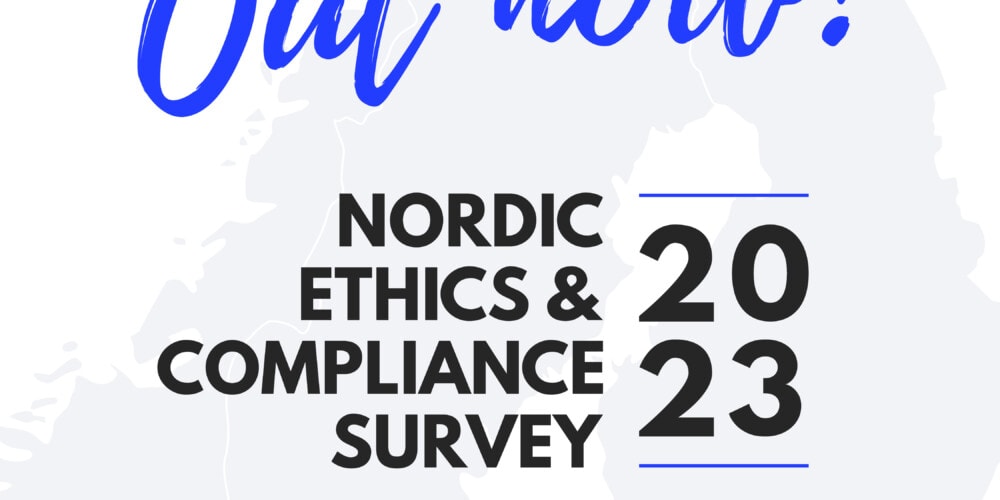EthicsTalk LIVE: How useful are our Codes of Conduct?
This blogpost summarises the key takeaways from the EthicsTalk LIVE: How useful are our Codes of Conduct? The panelists included Klaus Moosmayer, the Chief Ethics, Risk and Compliance Officer at Novartis, Mary Shirley, Head of Compliance at Masimo and Markus Oksanen, Partner at DLA Piper. This discussion entails facts and figures from NBE’s 2022 Nordic Business Ethics Survey and 2023 Nordic Ethics & Compliance Survey as well as the expert insights and opinions. More information on the panelists on the event page.
Measuring effectiveness
When things go wrong, companies are put under a lot of pressure to make sure that they have learned their lessons. To demonstrate the corrective actions taken, companies typically proudly report the completion rates of their updated code of conduct eLearning and enhanced policies. Can you actually measure the effectiveness of your compliance program through the completion rate of your code of conduct training? Mary suggests that even though she thinks we ought to continue following the completion rate, a more effective KPI would be to follow have employees been able to observe, retain and apply the information from the training. She suggests that companies take the learning objectives and apply them in your more untraditional compliance activities such as a game of Jeopardy. There you can see how well employees do, without putting them under the spotlight.
Compromising the Code
59% of Nordic respondents had compromised their personal ethics and 55% their company Code of Conduct or policy. When looking at the leaders; top managers (68%) and line managers (72%) are the ones making most often compromises on company code of ethics. The difference is dramatic when we look at the age groups: 73% of the 18–19-year-olds make personal compromises on ethics, where the figure is only 33% for 60+. Code of Conduct compromises are most common in publicly listed companies: 65% vs. 51% private sector and 58% public sector.
Markus raises an interesting point on compliance leading companies and taking away innovation in response to how company management can prevent creating a culture where people get pressured to act unethically, despite of having a “perfect Code of Conduct”. He suggests that just like in risk management, the solution comes through diversity. Different types of people combined with different types of roles can create a balance where innovation and pushing boundaries stays within ethical limits. Klaus compliments Markus’ thought by sharing that they try to begin even their management meetings with a small exercise where the group ponders on an ethical dilemma or shares a personal story. The key is openness.
Accountability and meaning of Codes of Conduct
Every third line manager believes that that unethical conduct is not disciplined in their organization. The same number of respondents did not have a clue how to act when they suspect or witness unethical or illegal conduct in their organisation. Every second line manager and top manager have experienced retaliation after intervening in unethical behaviour. Understanding these experiences and their root causes is where to start from when a company wants to grow its ethics.
Markus mentions that a code of conduct in Finland is typically a part of employment agreements. By minimum it is a document that is an employer’s instructions and thus breaching it, means breaching the obligations of the employment. However, it should be noted that Codes of Conduct contains various topics of which some are clearer from a juridical point of view than others, such as embracing the company values. The legal relevance of the topics differs, but all in all, the obligations set in the Code are a reason for termination, if not complied with. Obligations that are part of commercial contracts, such as Partner or Supplier Codes of Conduct are fully part of the legal domain.
Our Code of Conduct is the constitution of the company.
Klaus Moosmayer, the Chief Ethics, Risk and Compliance Officer at Novartis
Finally, Klaus states that for them their Code of Conduct is the constitution of the company. He emphasizes that it is a legal document that also speaks to the heart. If there is no heart, it becomes meaningless, and people will forget it. It will also fail to hold people accountable for their actions. Klaus wants their employees to be touched by it, but also clearly understand the level of expectation it sets forward.
If you want more of the same topic, make sure you watch the webinar recording from Nordic Business Ethics’ YouTube channel.



